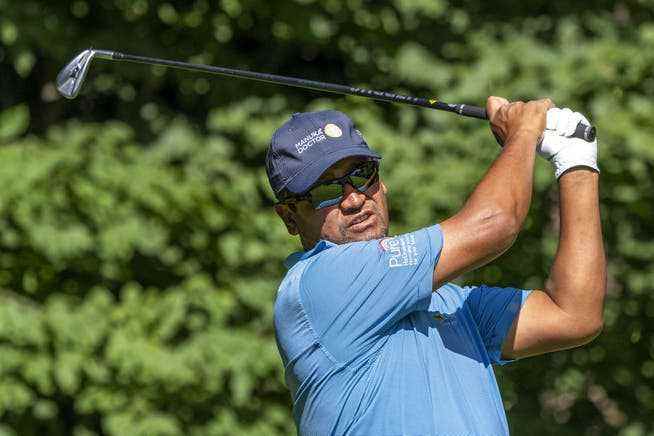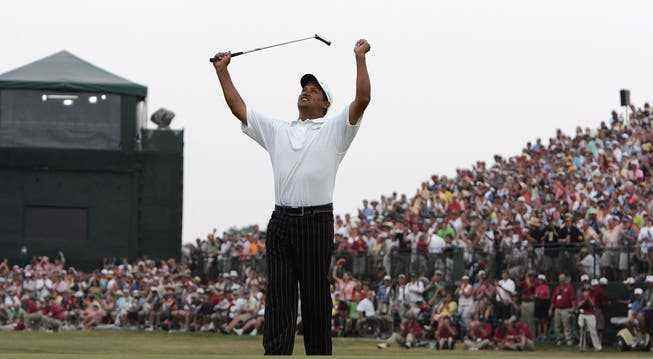In June 2005, New Zealander Michael Campbell made history. He was the first Maori to win a major golf tournament, and he did so in a duel with world star Tiger Woods. In his youth Campbell had to overcome forms of racism.
Michael Campbell at his historic triumph: In June 2005 he won the US Open in Pinehurst, North Carolina.
“Maori don’t play golf,” he was told as a teenager, it was a sport for the white and the rich. That’s what Michael Campbell, who descends from the indigenous New Zealand population, tells in the clubhouse in Bad Ragaz, where he competed in the international senior tournament in the last few days.
When he said at school that he wanted to become a golf pro, he was laughed at and declared crazy. “But I wanted to be a pioneer and tear down walls. Showing the world what Maori can do when they live out their passion. And open their eyes.”
He succeeded: In June 2005, Campbell won a major title at the US Open in Pinehurst, as the first Maori and only the second New Zealander after Bob Charles in 1963. And what made the triumph all the more valuable: he had an exciting duel against the World star Tiger Woods, who was in the prime of his career at the time.
Hole 11: soooo close! Next tap in par for@MCampbellgolf– he stays at -4, onwards!#SwissSeniorsOpen #GolfclubBadRagaz @euLegendsTour pic.twitter.com/mx0YyU7ML2
— Swiss Seniors Open (@SeniorsOpen) July 8, 2022
When he didn’t have a pen to put the ball on, he used sheep dung
At home, comparisons were made with a famous compatriot. Campbell must feel like Sir Edmund Hillary after his first ascent of Mount Everest, it said. And Tiger Woods was also aware of the historical dimension.
The American paid tribute to Campbell at the victory ceremony in Pinehurst. Woods had never done that before as a runner-up in a tournament, his New Zealand caddy assured him, Campbell said. Woods may have remembered his own career, as he also had to overcome resistance in the USA due to the color of his skin.
Was there racism in New Zealand? Campbell, now 53, is dabbling in diplomacy – and then says there have been times before when he was denied entry to a clubhouse and had to change in the car park. “But that only motivated me more.”

Michael Campbell today, at the international senior tournament in Bad Ragaz.
When school was out at 3:30 p.m., he would dash to the golf course on his BMX bike to hit a few more balls. In winter he had to hurry because it was getting dark soon. And sometimes he had to use the most primitive tools. If he didn’t have a pen to put the ball on, he found a replacement in the form of sheep dung on the meadow of a neighboring farm.
Only: Even his mother didn’t really want to believe in his chance. She insisted that he do an apprenticeship as an administrator at a telecommunications company. Campbell says he only completed the course for the sake of his parents, who worked hard for him. But actually he was just waiting to finally be able to travel the world as a golfer.
It was too cold for him in Switzerland – now he runs a golf academy in Marbella
Campbell left New Zealand at the age of 21 – and to this day he has not settled there again, although he feels very connected to the down-to-earth Maori culture. But he would be too far away from the big tournaments. When he occasionally visits his homeland for ten days, he goes to schools to encourage teenagers to play golf. The number of Maori in this sport has multiplied, he says.
Campbell is based in Marbella, Spain. He has been running a golf academy there for ten years. After his triumph at the US Open, Jack Nicklaus, the greatest golfer in history, drummed into him that he had to give something back to the sport, to help develop the game, and he followed that. Before Campbell moved to Spain, he had lived in Cugy near Lausanne, “but it was too cold for me there, I longed for more sun”.
Campbell grew up in the region of the New Zealand capital Wellington, which is generally regarded as one of the windiest metropolises in general. And maybe that was his great luck. Because in the legendary duel with Tiger Woods, the players also had to brave the strong wind. The ways of destiny are often unfathomable.
The wind also likes to blow in Bad Ragaz, where Campell wanted to fight for victory on Sunday. It wasn’t enough for him: He finished the senior tournament in 24th place.
Hole 16: What a beautiful touch by@MCampbellgolf!
Unfortunately, he missed the following birdie attempt from inside 3 feet and stays at -4.#SwissSeniorsOpen #GolfclubBadRagaz @euLegendsTour pic.twitter.com/jOnAsbBjWd— Swiss Seniors Open (@SeniorsOpen) July 8, 2022
